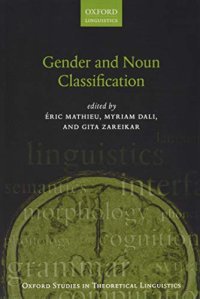
Ebook: Gender and Noun Classification
- Series: Oxford Studies in Theoretical Linguistics
- Year: 2019
- Publisher: Oxford University Press
- Edition: Illustrated
- Language: English
- pdf
This volume explores the many ways by which natural languages categorize nouns into genders or classes. A noun may belong to a given class because of its logical or symbolic similarities with other nouns, because it shares a similar morphological form with other nouns, or simply through an
arbitrary convention. The aim of this book is to establish which functional or lexical categories are responsible for this type of classification, especially along the nominal syntactic spine.
The book's contributors draw on data from a wide range of languages, including Amharic, French, Gitksan, Haro, Lithuanian, Japanese, Mi'kmaw, Persian, and Shona. Chapters examine where in the nominal structure gender is able to function as a classifying device, and how in the absence of gender,
other functional elements in the nominal spine come to fill that gap. Other chapters focus on how gender participates in grammatical concord and agreement phenomena. The volume also discusses semantic agreement: hybrid agreement sometimes arises due to a distinction that grammars encode between
natural gender on the one hand and grammatical gender on the other. The findings in the volume have significant implications for syntactic theory and theories of interpretation, and contribute to a greater understanding of the interplay between inflection and derivation. The volume will be of
interest to theoretical linguists and typologists from advanced undergraduate level upwards.
arbitrary convention. The aim of this book is to establish which functional or lexical categories are responsible for this type of classification, especially along the nominal syntactic spine.
The book's contributors draw on data from a wide range of languages, including Amharic, French, Gitksan, Haro, Lithuanian, Japanese, Mi'kmaw, Persian, and Shona. Chapters examine where in the nominal structure gender is able to function as a classifying device, and how in the absence of gender,
other functional elements in the nominal spine come to fill that gap. Other chapters focus on how gender participates in grammatical concord and agreement phenomena. The volume also discusses semantic agreement: hybrid agreement sometimes arises due to a distinction that grammars encode between
natural gender on the one hand and grammatical gender on the other. The findings in the volume have significant implications for syntactic theory and theories of interpretation, and contribute to a greater understanding of the interplay between inflection and derivation. The volume will be of
interest to theoretical linguists and typologists from advanced undergraduate level upwards.
Download the book Gender and Noun Classification for free or read online
Continue reading on any device:

Last viewed books
Related books
{related-news}
Comments (0)